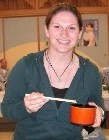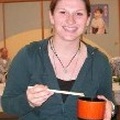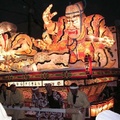“I’m turning Japanese, I think I’m turning Japanese.”
I’m a Caucasian American from California, but for the last year and a half these classic 80s lyrics from the song “Turning Japanese” by the Vapors have been my theme song. Since July 2005, I have been living in Aomori (northern Japan), the land of the oh-so-delicious Fuji apples. A five-minute walk from my house will put you in the middle of rice fields, and on the way you’ll meet no one but old grannies and granddaddies. I love it!
I am a second year assistant language teacher (ALT) in the Japan Exchange and Teaching (JET) program. The JET program just turned 20 years old and was established to promote internationalization in Japan through foreign language education in schools, boards of education, and local governments. I teach English to elementary and junior high school students, so I get to do my fair share of internationalization. But in all honesty, I think I’ve been internationalized more than I’ve been internationalizing.
So how have I been internationalized? Let’s start with the inside of my refrigerator. Like most other Americans, you can find: milk, orange juice, eggs, butter, mayonnaise, et cetera. But I wonder how many Americans (well at least the Caucasian ones) have a constant supply of miso (fermented soy bean paste), natto (fermented soy beans), tsukemono (pickled vegetables), tofu, and aloe flavored yogurt? I do now!
Aside from a Japanese diet, I’ve also picked up on many of the subtle Japanese gestures and characteristics. I now point to my nose when I’m referring to myself. I cover my mouth with one hand while I use a toothpick. I also do this when I’m speaking on my cell phone in public areas. While I’m on the phone with other Japanese people, I start bowing like crazy to the person I’m speaking to as if they were right in front of me. I have a couch I used to sit on, but now I spend most of the time sitting on the floor. And I feel absolutely guilty if I run into my house with my shoes on! The list goes on and on.
When I first came to Japan, I mainly associated with other ALTs and foreigners in the area because I didn’t have any Japanese friends. I was still very much American, whatever that means, during that time. I didn’t start “turning Japanese” until I started making Japanese friends and really getting involved at the schools. This opened the door for me to get involved with the community and truly become immersed in Japanese culture.
Because I speak Japanese, the students feel comfortable coming up and talking to me. At the elementary schools, the students always want to play, so now I know just about every version of Japanese tag. My students have taught me that all decisions and disputes can be settled by janken (rock, paper, or scissors). One thing I do find amazing with the students here is they don’t get upset if other students interrupt their game. I’ll be playing tag with the kids and some other kid will come bursting through with their unicycle or basketball and it doesn’t even faze them. Before, I always wanted to shout “watch out!” or tell them to stay in their area because that’s what we would do in America, but my kids have unknowingly taught me the value of sharing space.
Every Monday, I go to a free Japanese class held for foreigners to help them with their Japanese studies. My original motive was to improve my Japanese language skills, but the volunteer Japanese teachers have all become good friends. A few have actually turned into some of my best friends here who I can confide in and ask for advice about anything, including dating in Japan (I’ll get to that later!). I’ve also learned how to appreciate good sake (rice wine) at izakayas (a type of Japanese bar) and how to enjoy karaoke afterwards.
I also play volleyball at the local gym with a volleyball league. My team gets together almost every week and we have a great time playing together. At first we were only teammates and I was the token foreigner, but our relationships have budded into friendships. They teach me all sorts of useful phrases in the local dialect, and I teach them fun English they never would have learned in school. Imagine a twenty-eight year old kakko-ii (cool) Japanese guy saying “Uh oh, spaghettio!”
Last summer, one of my Japanese friends asked me to join her in playing taiko (Japanese drums). Despite my lack of rhythm, I jumped at the chance. We practiced for two months and I was able to perform in the local summer festival. I played taiko with a group called “Wa-no-kai” for two hours a day, five days in a row in a traditional festival costume. Many of my students also participated and this gave us the opportunity to get to know each other better, and I was able to make many more Japanese friends.
When I first came to Japan, I didn’t know anyone and was constantly stared at because I was the foreigner. Now, anywhere I go (including the local baths; talk about having an intimate relationship!), I see people I know. I know I’ll never fully become Japanese but I don’t really want to. But picking up some of the habits, gestures, and characteristics has helped me make life long friends and have amazing experiences.
My friend recently asked me what I expected returning to America would be like. My answer to her is I don’t know if I’ll ever be going back. I started dating a guy last year and let me tell you, dating a Japanese guy can be very interesting. I could write another article on just our initial dating period as it was filled with all sorts of hilarious cultural misunderstandings and mishaps. But, now “love is in the air” and we’ll just have to wait and see.
© 2007 Allison Reed





